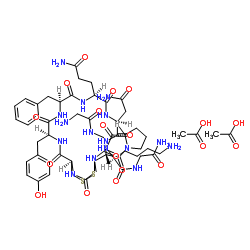Terlipressin Acetate
Modify Date: 2025-08-26 22:24:56

Terlipressin Acetate structure
|
Common Name | Terlipressin Acetate | ||
|---|---|---|---|---|
| CAS Number | 914453-96-6 | Molecular Weight | 1347.476 | |
| Density | N/A | Boiling Point | N/A | |
| Molecular Formula | C52H74N16O15S2.xC2H4O2 | Melting Point | N/A | |
| MSDS | N/A | Flash Point | N/A | |
Use of Terlipressin AcetateTerlipressin acetate is a vasopressin analogue with potent vasoactive properties. Terlipressin acetate is a highly selective vasopressin V1 receptor agonist that reduces the splanchnic blood flow and portal pressure and controlling acute variceal bleeding. Terlipressin acetate exerts anti-inflammatory and anti-oxidative effects. Terlipressin acetate has the potential for hepatorenal syndrome and norepinephrine-resistant septic shock treatment[1][2][3][4][5]. |
| Name | Terlipressin Acetate |
|---|---|
| Synonym | More Synonyms |
| Description | Terlipressin acetate is a vasopressin analogue with potent vasoactive properties. Terlipressin acetate is a highly selective vasopressin V1 receptor agonist that reduces the splanchnic blood flow and portal pressure and controlling acute variceal bleeding. Terlipressin acetate exerts anti-inflammatory and anti-oxidative effects. Terlipressin acetate has the potential for hepatorenal syndrome and norepinephrine-resistant septic shock treatment[1][2][3][4][5]. |
|---|---|
| Related Catalog | |
| Target |
Vasopressin V1 receptor[1] |
| In Vitro | Terlipressin (25 nM; 24-72 hours; IEC-6 cells) treatment significantly improves cell viability, proliferation and apoptosis in IEC-6 cells[1]. Terlipressin inhibits the secretion of TNF-α and 15-F2t-isoprostane from IEC-6 cells following oxygen and glucose deprivation/re-oxygenation (OGD/R). Terlipressin administration following OGD attenuates OGD/R-induced cell damage via the PI3K signaling pathway[1]. Cell Proliferation Assay[1] Cell Line: IEC-6 cells induced by oxygen and glucose deprivation/re-oxygenation (OGD/R) Concentration: 25 nM Incubation Time: 24 hours, 48 hours, 72 hours Result: Significantly increased the proliferation of IEC-6 cells. |
| In Vivo | Using a mouse nonlethal hepatic ischemia-reperfusion (IR) model, Terlipressin administration significantly ameliorates IR-induced liver apoptosis, necrosis and inflammation[3]. |
| References |
| Molecular Formula | C52H74N16O15S2.xC2H4O2 |
|---|---|
| Molecular Weight | 1347.476 |
| Exact Mass | 1346.538330 |
| InChIKey | BYDVFOPTAIPAGA-LCGYVTRFSA-N |
| SMILES | CC(=O)O.NCCCCC(NC(=O)C1CCCN1C(=O)C1CSSCC(NC(=O)CNC(=O)CNC(=O)CN)C(=O)NC(Cc2ccc(O)cc2)C(=O)NC(Cc2ccccc2)C(=O)NC(CCC(N)=O)C(=O)NC(CC(N)=O)C(=O)N1)C(=O)NCC(N)=O |
| Storage condition | -20°C |
| (2S)-1-{[(4R,7S,10S,13S,16S,19R)-19-{[({[(Aminoacetyl)amino]acetyl}amino)acetyl]amino}-7-(2-amino-2-oxoethyl)-10-(3-amino-3-oxopropyl)-13-benzyl-16-(4-hydroxybenzyl)-6,9,12,15,18-pentaoxo-1,2-dithia-5,8,11,14,17-pentaazacycloicosan-4-yl]carbonyl}-N-{(2S)-6-amino-1-[(2-amino-2-oxoethyl)amino]-1-oxo-2-hexanyl}-2-pyrrolidinecarboxamide acetate (1:2) |